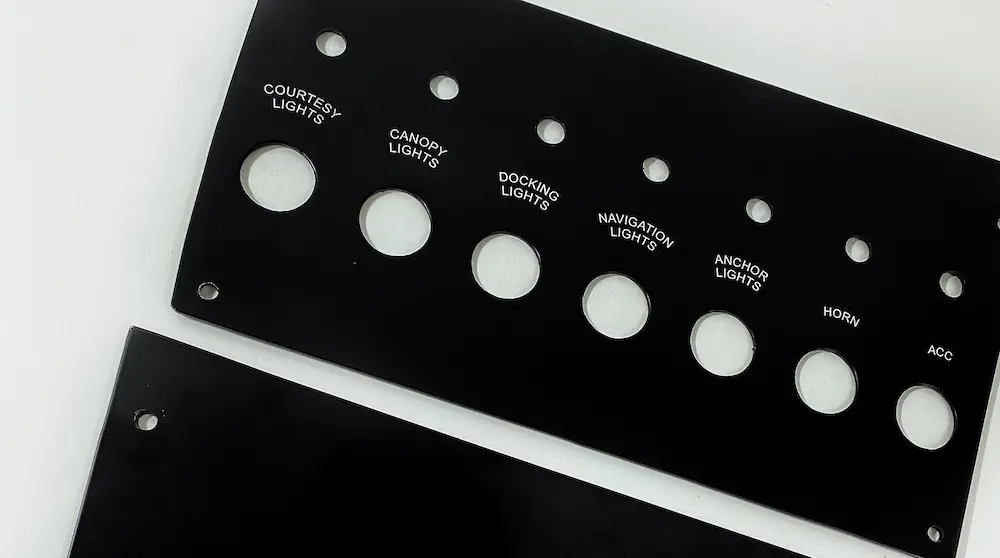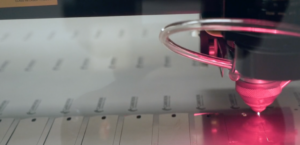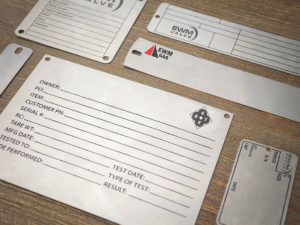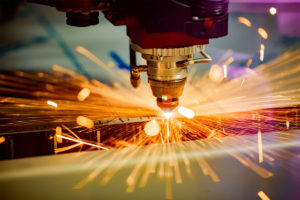
Custom industrial control panels are crucial for ensuring efficiency and safe operation of equipment on your worksite. Control panels are affixed to industrial equipment such as switchboards, lighting panels, motors, and more, and provide clear and legible labels and operating instructions. They are especially common in heavy industrial applications such as the oil and gas and construction industries.
At Etched, we have extensive experience manufacturing custom industrial control panels, including laser cutting the fabrication and etching, engraving, or printing the necessary information. In this buyer’s guide, we’ll walk through the material and process options and how to specify your order of custom industrial control panels.
Specifying the fabrication of your control panel
We use a laser cutter to place and drill the necessary holes in your custom control panel. To specify your order, all we need is a drawing, diagram, or description of the part you need. If you’re ordering more of an existing panel, dimensions and specs of the panel are required.
Selecting the right material for your industrial control panel
Since control panels are commonly installed in industrial environments and under extreme or abrasive conditions, it is crucial to select a durable and robust substrate. We manufacture control panels in the following materials:
Stainless steel
Stainless steel is the most popular material choice for control panels, since it is the most durable and rugged substrate and will last a long time even in harsh industrial environments. Stainless steel is best suited for withstanding the elements and resisting corrosion and abrasion, making it ideal for control panels installed in coastal environments.
At Etched, we stock stainless steel in 0.018” – 0.125” thicknesses. Both 316 and 304 stainless steel are available in most thicknesses. When ordering, you can also specify the finish option. The #4 finish contributes a shinier exterior to your control panel, whereas the #2B has a matte/duller finish.
Aluminum
Aluminum control panels are rugged, durable, and long-lasting, but are slightly less resistant to corrosion and abrasion compared to stainless steel. Aluminum is a popular choice for indoor applications or industries where weight is at a premium, since aluminum is significantly lighter than stainless steel. At Etched, we stock aluminum in 0.012” – 0.125” thicknesses, with other thicknesses available upon request.
Anodized aluminum
Anodized aluminum is protected by an extra coating providing abrasion and corrosion resistance. Anodized aluminum offers the same light weight as raw aluminum, making it popular for aerospace and transportation applications, but has enhanced durability. If you select anodized aluminum for your custom control panels, you can choose the color, including clear, black, blue, green, red, or yellow.
Plastic
Plastic is the least durable substrate, making it a less common choice for industrial control panels. However, plastic can be a cost-effective option for indoor applications or environments without direct sunlight or the need for extreme rigidity. Plastic also offers a high contrast and legibility when combined with engraved text on a different color background.
Selecting the right process type for your industrial control panel
Rotary engraving
Long-term legibility is extremely important for industrial control panels, making rotary engraving the most popular process type. Etched uses an engraving bit to etch a groove 0.003 to 0.007 inches into the substrate. The groove can then be filled with paint for greater legibility and contrast.
Rotary engraving is extremely precise and repeatable, since the drill follows a pre-programmed toolpath, making it more cost-efficient to manufacture multiple rotary engraved industrial control panels at once.
Rotary engraving can be selected as a process option for any of our control panel substrates, including stainless steel, aluminum, anodized aluminum, and plastic.
Chemical etching
Chemical etching involves dissolving parts of the substrate in acid, leaving protected areas in sharp relief. Etching is another highly long-lasting and durable process type, and is highly resistant to corrosion and abrasion.
Chemical etching can be selected as a process type for stainless steel, aluminum, and anodized aluminum, but not plastic.
Metalphoto processing
Metalphoto processing works only with anodized aluminum. A UV-stable image is permanently sealed inside the protective anodized coating layer, making it highly resistant to chemicals, the elements, abrasion, and corrosion. Metalphoto control panels can last for over twenty years, even in intense and direct sunlight.
Laser engraving
Fiber and CO2 lasers are ideal for durable metal marking applications, creating a high-contrast image with a lot of depth. Laser engraving can be selected as a process option for any control panel substrate, including stainless steel, aluminum, anodized aluminum, and plastic.
Screen printing
Screen printing is the least durable and long-lasting process type, making it less popular for industrial control panels. However, it is cost-effective and will still create a crisp, clear, and durable control panel, especially for indoor applications.
Screen printing can be selected as a process option for any control panel substrate, including stainless steel, aluminum, anodized aluminum, and plastic.
How to select the right industrial control panel supplier
When selecting an industrial control panel supplier, be sure to partner with a team that has deep expertise with all substrate and material types. Here are a few factors to consider:
- Material quality: Use high-quality materials to ensure durability and longevity of your industrial control panels.
- Lead time: Make sure you have the control panels you need, when you need them, and ask about rush orders and expedited shipping options.
- Manufacturing location: Partnering with a U.S.-based control panel manufacturer can help mitigate the risk of timely and costly supply chain issues.
Ready to get started?
Have additional questions about custom industrial control panels? Our expert team would love to help. Contact us today!



